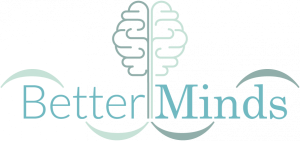Cognitive Behavioural Therapy
Cognitive Behaviour Therapy (CBT) is the most researched therapy and it consistently proves more effective than alternatives. It has even been shown to be more effective than medication in managing recovery and the underlying feelings that drive addictive behaviours. It is also effective at addressing eating disorders, phobias, depression and acute anxiety. CBT has a huge selection of science based tools and techniques that can be easy integrated into recovery works. These tools will support you to become a better and more flexible practitioner. CBT is constantly evolving, the Third Wave approach incorporates aspects of mindfulness and acceptance of thoughts and feelings instead of trying to change them. Acceptance and Commitment Therapy (ACT) is the Third Wave's key therapy. Alongside Motivational Interviewing, CBT skills for recovery training is essential for teams focused on creating change in their service users.
An Introduction to the Betterminds' Cognitive Behavioural Therapy Course
The Betterminds Cognitive Behavioural Therapy (CBT) training is designed to upskill practitioners in a diverse range of tools and techniques that stem from CBT.
This course has been delivered to a range of professionals who universally report how effective it is in helping them better understand and deliver existing approaches alongside hugely widening the range of strategies that they can quickly and effectively implement.
This course has been accessed by drug and alcohol workers, eating disorder practitioners, nurses and social prescribers plus residential practitioners including rehabs, prison practitioners and social housing providers.
If you are looking for a solid foundation to your practise and the core of over 100 years of tools and techniques then this course is for you and your team.
How Long is the Cognitive Behavioural Therapy Course?
The Betterminds’ Cognitive Behavioural Therapy Training runs for two days. This may be amended to meet your requirements.
What Will My Team Gain From The Betterminds' Cognitive Behavioural Therapy Course
The course covers the wide span of CBT including the tradition CBT that remains popular and also incorporates the core of the developments so that a whole host of tools are introduced. The training includes experience of how to apply these to specific events in recovery and practised so learners gain a broader understanding.
The training will included how to run a session using the CBT approach but also why CBT can explain each stage of addiction and equally offer adaptable strategies for those stages.
The training will upskill any practitioner to support someone from a point of embedded destructive behaviours, breaking habits, creating sustainable structures and dealing with lapse and preventing relapse.
CBT is critical for dealing with triggers, cravings and urges and also helps deal with destructive thoughts and feelings beyond recovery. With these skills you can support someone to recover but also to deal with life on life’s terms so that they can prosper independently beyond your support.
Your team will gain an understanding of the purpose and method of CBT with the ability to apply it, your team will also have access to a plethora of toolkits and resources that they will be able to apply to real-world situations that are specific to your industry and organisation.
Where Will The Betterminds' Cognitive Behavioural Therapy Course Be Useful
The Betterminds CBT training is critical to anyone who is working in the sphere of change. It is especially useful to deal with people who are vulnerable to addictive behaviours or destructive habits such as substance misuse, alcohol and drug addictive behaviours, gambling, disordered eating practitioners, self harming, but also across the mental health and social care spectrum including housing, criminal justice, those whose clients have depression and anxiety.
What Are The Primary Course Objectives
- Understand the key principles and concepts underpinning CBT approach to psycho-social interventions
- Practise identifying links between events, cognitions, feelings and physiology
- Use these links and associated tools and techniques to create change
- Experience and confidence in the tools and techniques that stem from behaviouralism, cognitive therapy, CBT and ACT
- Know about key CBT techniques including CBT structures, guided discovery, scaling and use of metaphor to create change and recovery
- A range of effective between-session strategies to promote recovery
- Know how to incorporate CBT into your everyday role
- Be a more confident, capable and empathetic practitioner
What Else Will Our Team Learn
- To move people through services more rapidly
- To build a culture of change
- Have a more consistent change culture that allows all staff to apply these science based techniques
- More easily meet KPIs
- Be a more confident and effective Team
